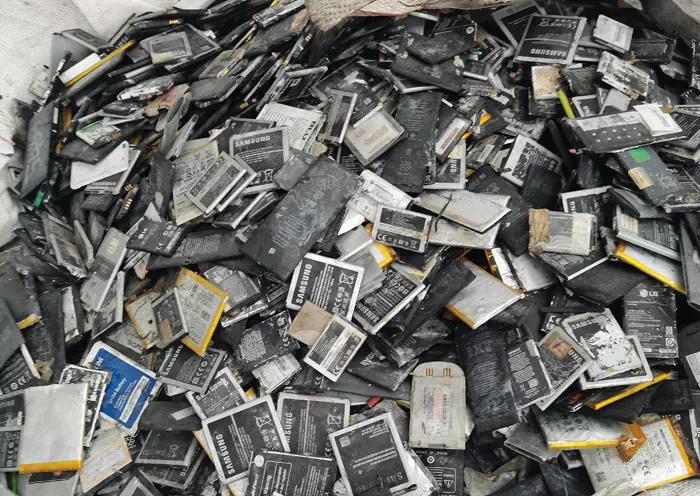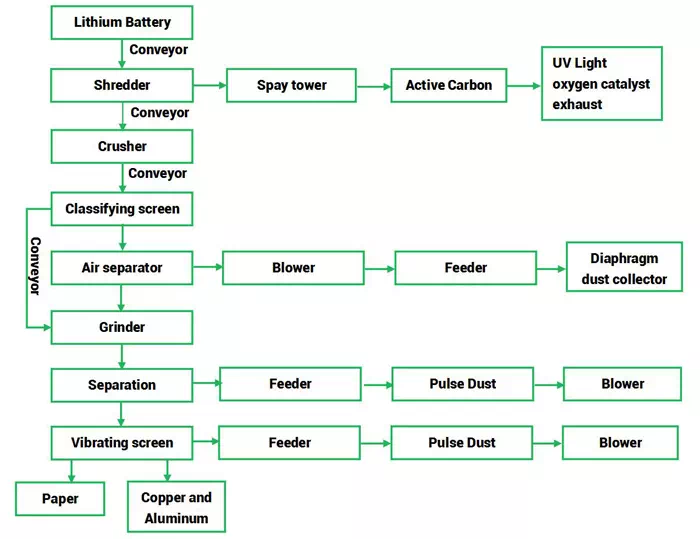Recycling spent lithium-ion batteries is of great significance for protecting natural resources and preventing environmental pollution.

Li-ion batteries are recycled by recovering metals and other materials from the batteries using mechanical and hydrometallurgical techniques. These techniques may involve shredding, dismantling, liquefying or dissolving batteries.
The recycling process usually starts with dismantling the battery and removing the parts that contain the electrodes, such as the battery cells. These parts are then chopped or crushed to produce a powdery part known as the black mass, which contains most of the valuable metals such as cobalt, nickel and lithium. The black matter is then further processed to separate and purify the metals by using different methods such as leaching, electrowinning, precipitation or solvent extraction. Recycled metals can be reused to make new batteries or other products.
Waste lithium battery recycling equipment is a kind of machinery that can process waste lithium-ion batteries and recover valuable materials from them. There are different types of equipment that use different methods and techniques to recycle lithium-ion batteries, such as shredding, dismantling, liquefying or dissolving the batteries, followed by separation and purification of the metals.
SUNY GROUP waste lithium-ion battery crushing and sorting equipment: This equipment adopts full-component, high-efficiency clean recycling technology, and can process lithium-ion batteries of different systems and specifications.

Using a mechanical process that involves shredding, sorting and separating metal from plastic casings and other materials.
The waste lithium battery recycling technology equipment developed by SUNY GROUP can process waste lithium-ion batteries and recover valuable materials from them, and separate and recover metals and materials from waste lithium-ion batteries. In order to realize the recycling and reuse of end-of-life lithium batteries.
The economic value of lithium-ion battery recycling refers to the potential benefits or profits gained from recovering valuable materials from spent lithium-ion batteries for reuse in new battery production or other uses. The economic value of lithium-ion battery recycling depends on several factors, such as the type and composition of the battery, recycling methods and technologies, market prices and demand for recycled materials, and the environmental and social impact of recycling.
The global lithium-ion battery recycling market size was estimated at USD 1.7 billion in 2020 and is projected to grow to USD 6.55 billion by 20283. The economic value of lithium-ion battery recycling varies with the type of cathode material used in the battery, as certain materials such as cobalt and nickel have higher market value and recycling efficiencies than others2. For example, one study reported that lithium-ion battery recycling could generate an economic benefit of $22,000 per ton by calculating the value of lithium and cobalt4.
The advantage of SUNY GROUP Lithium battery recycling equipment is the benefit or advantage gained by using machinery that can process used lithium-ion batteries and recover valuable materials from them. Some advantages of lithium battery recycling equipment are:
Green and low-carbon: Lithium battery recycling equipment mainly adopts physical recycling methods, does not produce harmful emissions or waste, and reduces the carbon footprint of battery production and disposal.
Energy saving and environmental protection: Lithium battery recycling equipment can reuse recycled materials to produce new batteries or other uses instead of mining and refining new materials, thus saving energy. This also protects the environment by conserving natural resources and preventing land and water pollution.
No secondary pollution: Lithium battery recycling equipment safely handles harmful substances such as electrolytes, separators, and current collectors in batteries, and properly disposes or converts them into harmless substances, thereby preventing secondary pollution.
Economic benefits: Lithium battery recycling equipment can recover valuable metals such as cobalt, nickel, and lithium from batteries, which have high market value and demand, thereby generating economic benefits. Recycled metal can be resold at prices that are nearly competitive with mined materials.
Lithium battery recycling equipment price is the cost or value of a machine that can process used lithium-ion batteries and recover valuable materials from them. The price of lithium battery recycling equipment will vary depending on factors such as the type and capacity of the equipment, recycling methods and technologies, market demand and supply of the equipment, quality and warranty of the equipment, etc.
The price of lithium battery recycling equipment also depends on the type of cathode material used in the battery, as some materials such as cobalt and nickel have higher recycling value and efficiency than others.
You can contact us directly for more information on these and other waste lithium battery recycling facilities.
Thank you for your interest in suny group. If you want to learn more about our E-waste recycling plant, copper wire recycling machine and other machines, Contact us now to find out what we can do for you next project!E-mail:sunymachine@gmail.com | Whatsapp:+8613674945231